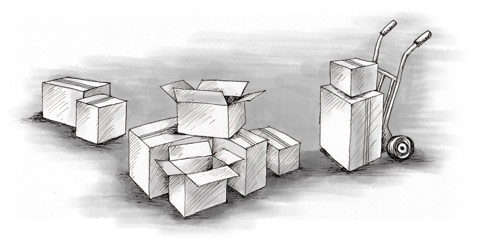Before making calls and asking for prices you should see how many belongings you have. Do you have a lot of things? If not, think about whether you could transport it yourself without difficulties. If you do, it is important to identify what you really want to take. Remember that you will have to pay for every cubic meter, even if you are not doing the heavy lifting yourself.
Getting a quote
Contrary to general belief, removal companies are not the money-grabbing organisations they are sometimes made out to be. Well, not all of them! Companies calculate their prices from a number of factors:
- The load size
- The distance to be travelled
- The type of furniture
- The number of men required for the job
Working out the inventory
To be able to get an exact quote, you need to provide the removal company with as much detail as possible. It is essential to have an inventory of what is to be moved. Often companies propose a visit your home to work out the size of the load. However, this is not compulsory, as good companies have the experience to talk to you and roughly work out how much you have to move. A full inventory from you will make this even easier. In general, an inventory achieves three important things:
- The removal company knows exactly what is to be taken (especially if you note the size of each item). Remember here to include such items as pianos (that may need three men to move them), snooker tables and items such as sit-on lawn mowers and other fragile, bulky, heavy or strange objects.
- In the event of an insurance claim you can prove that the removal company was transporting the items concerned
- It helps when you unpack as you can see where each numbered box should go. Using a simple spreadsheet makes this even easier and you can then use the same sheet when sorting out your home contents insurance.
The exercise of drawing up an inventory also allows you to think about what you don't need to take with you. After all, it is pointless to transport boxes of forgotten junk from attic to another. A move is a good opportunity to rationalise your possessions.
You probably have no idea how much space your household contents will fill in a van and even less of an idea how companies prepare their quotes. However, you are probably sure that 35 cubic metres is going to cost you more than if you say you have 31 cubic metres. We strongly recommend you resist this temptation. In this example the extra 4 cubic metres of load will normally not significantly change the price (as the extra cost is the loading and unloading time) so you don't gain much by misleading your provider. More importantly, a removal company is well within their rights to ask you to pay more on the day of the move if they are providing you with a different service than that which they quoted for. With your belongings on the van, you will not be in a very good bargaining position! The worst scenario is the possibility that something will have to be left behind because there is not enough room on the van!
To get a correct quote for what you need to move, follow these steps:
- Make a list of everything you need to move.
- Measure big items to work out how big they are in cubic metres.
- Estimate for each room how many boxes (of whatever size you decide) everything else will need. Measure a box to find their volume. You might find it helps to have a box with you when you do this as it may help you provide a more accurate estimate.
- Add it all up!
Also, take into account that it is not just the load and distance that affect your quote. You must remember to let the remover know of anything at either end that could affect the job. If you are moving to or from a flat, you need to indicate how many flights of stairs have to be negotiated and whether there is an elevator or not (and also how big it is and the load it can carry). You also need to consider things such as narrow roads (or even 'no roads') at either end, or any other obstacles that could affect the job.
Which company should you choose?
Once you have worked out what you want to move, you can then get quotes from different removal companies. If you want to make it as cheap as possible, you should look among smaller companies (do not expect to get all those extra services).
The chances that a company drives off with all your stuff and that you never see it again are slim. However, to be on the safe side you should check that it is accredited by an industry association. Some people do have nightmare experiences with removal companies; broken or missing goods, extortion of extra fees to release goods from storage or just bad service (not turning up when they are meant to, reorganizing timing with no notice, etc.).
Some companies offer a “groupage service”: where your possessions are allocated space in containers to fill them up, whenever there are a few spare square meters. In this case, it can take a few weeks or even months before everything arrives to its destination, but it is considerably cheaper. Whichever company you choose, do not forget to bargain. You could be surprised of the reductions or extra services that can be negociated.
Besides the price, it is also important that you check what services the different removal companies provide. Some will only load in and load off your boxes; others will provide you with boxes and containers for you to pack; others will pack, load, transport, unload and unpack all your stuff (while you give them instructions from your armchair). Some might even help you with the cleaning and tiding up so be nice to them. Check if they transport pets, heavy items (such as pianos) and fragile items (chandeliers, vases, ceramics, etc). You should also make sure that the company gives you a guarantee of refund in case they do not succeed in transporting your stuff and that you get their maximum shipping time in writing.
Insurance for your move
If you have fragile or valuable items you should insure the load at once. Keep in mind that most insurance companies will cover your stuff with the condition that people from the removal company packed it (if you do not get the full service it is possible that you will be uncovered). The cost of the insurance is of 1% or 2% of the load’s total worth, depending on the amount of cover that you get.
Insuring your stuff with the same company that transports it can be a disadvantage as they will question every claim you make, so you’re better off insuring it with someone else. You should also take photographs before you pack your things as these can be used as proof in the case of damage.




